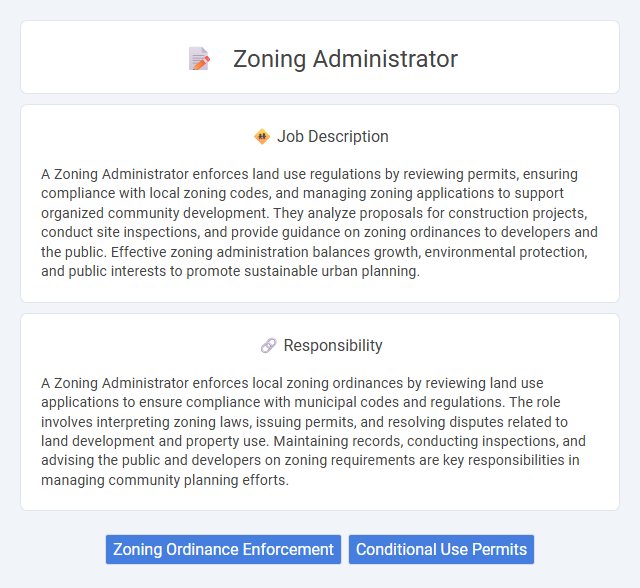
A Zoning Administrator enforces land use regulations by reviewing permits, ensuring compliance with local zoning codes, and managing zoning applications to support organized community development. They analyze proposals for construction projects, conduct site inspections, and provide guidance on zoning ordinances to developers and the public. Effective zoning administration balances growth, environmental protection, and public interests to promote sustainable urban planning.
Individuals with strong attention to detail and an interest in urban planning are likely to find the role of a zoning administrator suitable. Those who are comfortable interpreting complex regulations and communicating effectively with diverse stakeholders may have a higher probability of success. Conversely, people who struggle with regulatory compliance or lack patience for bureaucratic processes might find this job less fitting.
Qualification
A Zoning Administrator typically requires a bachelor's degree in urban planning, public administration, or a related field, coupled with knowledge of local zoning laws, land use regulations, and municipal codes. Certification from organizations such as the American Planning Association (APA) or International Code Council (ICC) enhances job qualifications and credibility. Strong communication skills, attention to detail, and experience with regulatory compliance are essential for effectively enforcing zoning ordinances and facilitating development permits.
Responsibility
A Zoning Administrator enforces local zoning ordinances by reviewing land use applications to ensure compliance with municipal codes and regulations. The role involves interpreting zoning laws, issuing permits, and resolving disputes related to land development and property use. Maintaining records, conducting inspections, and advising the public and developers on zoning requirements are key responsibilities in managing community planning efforts.
Benefit
A zoning administrator job likely offers benefits such as comprehensive healthcare coverage and retirement plans, enhancing job security and employee well-being. The role may provide opportunities for professional growth through training and certifications, increasing career advancement potential. Flexible work schedules and community impact involvement could further improve work-life balance and job satisfaction probabilities.
Challenge
Zoning administrators likely face complex challenges in balancing community development goals with regulatory compliance, requiring careful interpretation of zoning codes. They probably encounter frequent conflicts between property owners and local governments, necessitating strong negotiation and problem-solving skills. The evolving nature of urban planning and legal frameworks may demand continuous learning and adaptability from professionals in this role.
Career Advancement
A zoning administrator plays a crucial role in interpreting land use regulations and ensuring compliance with local zoning codes, paving the way for career advancement into urban planning or municipal management positions. Expertise in zoning law, project management, and community development enhances opportunities for leadership roles such as zoning director or city planning manager. Continuous professional development and certifications in land use planning or public administration further accelerate career growth and influence within government agencies.
Key Terms
Zoning Ordinance Enforcement
A Zoning Administrator is responsible for enforcing local Zoning Ordinances to ensure land use complies with municipal regulations and development standards. This role involves reviewing building permits, conducting site inspections, and addressing zoning violations to maintain orderly community growth. Effective enforcement of zoning laws supports sustainable urban planning and protects property values within the jurisdiction.
Conditional Use Permits
Zoning administrators play a critical role in reviewing and processing Conditional Use Permits (CUPs), ensuring proposed land uses comply with local zoning regulations and community standards. They evaluate permit applications by analyzing impact studies, public comments, and zoning codes to determine if the proposed use aligns with the neighborhood's character and comprehensive plan. Enforcement of CUP conditions and coordination with planning commissions and developers are key responsibilities to maintain orderly urban development.
 kuljobs.com
kuljobs.com